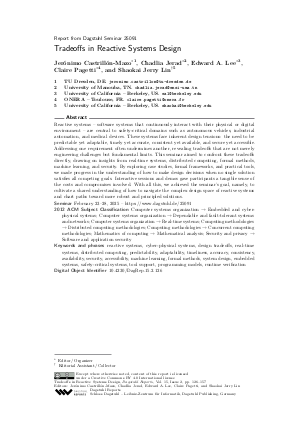Tradeoffs in Reactive Systems Design (Dagstuhl Seminar 25091)
Authors Jerónimo Castrillón-Mazo, Chadlia Jerad, Edward A. Lee, Claire Pagetti, Shaokai Jerry Lin and all authors of the abstracts in this report
-
Part of:
Issue:
Dagstuhl Reports, Volume 15, Issue 2
Part of: Volume: Dagstuhl Reports, Volume 15
Part of: Journal: Dagstuhl Reports (DagRep) - License:
 Creative Commons Attribution 4.0 International license
Creative Commons Attribution 4.0 International license
- Publication Date: 2025-10-06
File

PDF
DagRep.15.2.126.pdf
- Filesize: 2.69 MB
- 32 pages
Document Identifiers
Subject Classification
ACM Subject Classification
- Computer systems organization → Embedded and cyber-physical systems
- Computer systems organization → Dependable and fault-tolerant systems and networks
- Computer systems organization → Real-time systems
- Computing methodologies → Distributed computing methodologies
- Computing methodologies → Concurrent computing methodologies
- Mathematics of computing → Mathematical analysis
- Security and privacy → Software and application security
Keywords
- reactive systems
- cyber-physical systems
- design tradeoffs
- real-time systems
- distributed computing
- predictability
- adaptability
- timeliness
- accuracy
- consistency
- availability
- security
- accessibility
- machine learning
- formal methods
- system design
- embedded systems
- safety-critical systems
- tool support
- programming models
- runtime verification
Metrics
- Access Statistics
-
Total Accesses (updated on a weekly basis)
0PDF Downloads0Metadata Views
Abstract
Reactive systems - software systems that continuously interact with their physical or digital environment - are central to safety-critical domains such as autonomous vehicles, industrial automation, and medical devices. These systems face inherent design tensions: the need to be predictable yet adaptable, timely yet accurate, consistent yet available, and secure yet accessible. Addressing one requirement often undermines another, revealing tradeoffs that are not merely engineering challenges but fundamental limits. This seminar aimed to confront these tradeoffs directly, drawing on insights from real-time systems, distributed computing, formal methods, machine learning, and security. By exploring case studies, formal frameworks, and practical tools, we made progress in the understanding of how to make design decisions when no single solution satisfies all competing goals. Interactive sessions and demos gave participants a tangible sense of the costs and compromises involved. With all this, we achieved the seminar’s goal, namely, to cultivate a shared understanding of how to navigate the complex design space of reactive systems and chart paths toward more robust and principled solutions.
Cite As Get BibTex
Jerónimo Castrillón-Mazo, Chadlia Jerad, Edward A. Lee, Claire Pagetti, and Shaokai Jerry Lin. Tradeoffs in Reactive Systems Design (Dagstuhl Seminar 25091). In Dagstuhl Reports, Volume 15, Issue 2, pp. 126-157, Schloss Dagstuhl – Leibniz-Zentrum für Informatik (2025)
https://doi.org/10.4230/DagRep.15.2.126
BibTex
@Article{castrillonmazo_et_al:DagRep.15.2.126,
author = {Castrill\'{o}n-Mazo, Jer\'{o}nimo and Jerad, Chadlia and Lee, Edward A. and Pagetti, Claire and Lin, Shaokai Jerry},
title = {{Tradeoffs in Reactive Systems Design (Dagstuhl Seminar 25091)}},
pages = {126--157},
journal = {Dagstuhl Reports},
ISSN = {2192-5283},
year = {2025},
volume = {15},
number = {2},
editor = {Castrill\'{o}n-Mazo, Jer\'{o}nimo and Jerad, Chadlia and Lee, Edward A. and Pagetti, Claire and Lin, Shaokai Jerry},
publisher = {Schloss Dagstuhl -- Leibniz-Zentrum f{\"u}r Informatik},
address = {Dagstuhl, Germany},
URL = {https://drops.dagstuhl.de/entities/document/10.4230/DagRep.15.2.126},
URN = {urn:nbn:de:0030-drops-230878},
doi = {10.4230/DagRep.15.2.126},
annote = {Keywords: reactive systems, cyber-physical systems, design tradeoffs, real-time systems, distributed computing, predictability, adaptability, timeliness, accuracy, consistency, availability, security, accessibility, machine learning, formal methods, system design, embedded systems, safety-critical systems, tool support, programming models, runtime verification}
}
